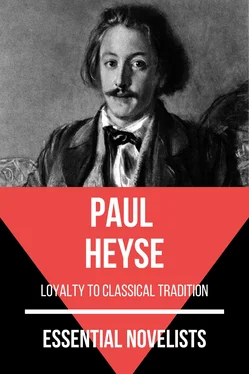"And yet you remained to the end."
"I? Why yes; in the first place I had a very comfortable seat; the box to which my ticket admitted me is like a little parlor, and happened to be almost empty. And then—but I will close the window. The air is beginning to grow cool,—don't you feel it? Besides, your friend Friezica has crept away."
Balder made no reply; but though his eyes were apparently closed, steadily watched Edwin, who, in a fit of absence of mind had thrown himself upon the bed only half undressed, and turned his face toward the wall. A half hour elapsed without any movement from either. Suddenly Edwin turned, and his eyes met his brother's quiet, anxious gaze.
"I see it won't do, child," said he. "For the first time in our lives, we are playing a farce with each other; at least I am, in trying to keep something from you. It is very foolish. What is the use of a man having a brother, especially one to whom he might be called married, except to share everything with him, not only the bread and butter, and whatever else he eats, but also what is gnawing at him. I will confess what has happened, though it is really nothing remarkable; a great many people have already experienced it; but when we feel it for the first time in our own persons, all our 'philosophy, Horatio,' will not permit us to dream what a singularly delightful, uncomfortable, troublesome, melancholy,—in a word, insane condition it is."
He had sprung from his bed and was now crouching on the foot of Balder's, half sitting, half leaning back, so that he was in shadow, and looked past his brother at the opposite wall.
"Prepare yourself to hear something very unexpected," he said, still in a tone which showed that he was making an effort to speak at all. "Or do you already know all I wish to tell you, young clairvoyant? So much the better. Then my confession will weary you, and at least one of us will be able to sleep. In short, my dear fellow, it is very ridiculous to say, but I believe it is only too true: I am in the condition which our physician in ordinary desired, in order to cast out the devil by Beelzebub; that is, I am in love, and as hopelessly, absurdly, and senselessly, as any young moth that ever flew into a candle. Pray, child," he continued, starting to his feet again and beginning to pace up and down the room, "first hear how it came about, that you may realize the full extent of my madness. You know that I am twenty-nine years old, and hitherto have been spared this childish disease. It is not necessary for everybody to catch the scarlet fever. As for the natural and healthy attractions of the 'fair sex,' I was old enough when our dear mother died, to feel that a woman like her would hardly appear on earth a second time. For the daily necessities of living and loving—which every human heart needs to retain its requisite warmth—I was abundantly supplied in our brotherly affection, to say nothing of the miserable, unamiable, and yet love-needing human race. And then, ought a man to have for his profession the science of pure reason, and, like any other thoughtless mortal, make a fool of himself over the first woman's face he sees, without any cause except that the lightning has struck him. Heaven knows why? It seems incredible, but I fear I have accomplished the impossible."
He sat down on the bed again, but this time so that his face was turned toward Balder. "I will allow you to study me thoroughly, without any mercy," he said, smiling. "This is the way a man looks, who suddenly becomes the sport of the elements,—whose reflection, wisdom, pride, and whatever else the trash may be called, are of no avail. I always shuddered when I read the story of the magnetic mountain. When I was a boy, I thought, defiantly, if I had only been on the ship, I would have set so many sails, sent so many men to work the oars, and steered in such a way, that the spell would not have reached me. And so I thought this evening, daring the whole of the first hour. But—
'Tales of magic e'er so strange,
Woman's wiles to truth can change.'
The helm is broken, the oars refuse their service, and the very portion of my nature that was steel and iron, most resistlessly obeys the attraction of the magnet, and really assists in making keel and deck spring asunder."
He leaned back again, and passed his hand over his brow. The hand trembled, and a cold perspiration stood on his forehead.
"There is only one thing I don't understand," said Balder, moving aside to make room for his brother; "why must all this be hopeless?"
"Just listen, my boy, and you will understand all, even the incomprehensible part, over which I am still puzzling my brains. For I am no artist, and can only give you a poor, shadowy outline of a certain face. I entered the box, which was perfectly empty, and I hoped it would remain so. Clad in my fourteen-thaler summer-suit and without gloves, I did not seem to myself exactly fit for society, and the person who opened the box looked at me as if he wanted to say, 'You ought to be up in the gallery, my friend, instead of in this holy of holies, to which I usually admit only people belonging to the great or demi monde.' I also did not like to sit down, simple as the matter might seem to be, on a chair that was better dressed than I. However, the mischief was done; I determined to assume a very elegant deportment, such as I had noticed at private colleges in young diplomatists, and hitherto had always considered mere buffoonery. So I leaned back in my chair like an Englishman, and glanced now at the stage, now at the parquet. As I have already said, there was such a buzzing and fluttering down below, the poor creatures in white gauze glittering with gold and huge wreaths of flowers tossed their arms and legs about so wildly, and the violins quavered so madly, that I already began to think: 'if this goes on long, you will go too.' Suddenly the door of the box was thrown wide open; while I had squeezed through a narrow chink, a young lady rustled in, a diminutive servant in livery and high shirt-collar, which almost sawed off the youngster's huge red ears, removed a blue silk cloak, the doorkeeper casting a contemptuous glance at me, rushed forward, drew up a chair, and officiously put a play-bill on the balustrade. The lady said a few words to the boy in an undertone, then chose the corner seat nearest the stage, raised a tiny opera-glass, and, without taking the slightest notice of me, instantly became absorbed in her enjoyment of art.
"I ought now to describe her to you; but description has its difficulties. Do you remember the pastille picture from the Dresden gallery, painted by a Frenchman,—I have forgotten his name,—stay, I think it was Liotard; we saw a photograph of it in the medical counsellor's book of beauty?—la belle Chocoladièrewas written underneath. Well, the profile before me was something like that, and yet very very different, far more delicate, pure, and childlike, without any of the pretentious, cold-hearted expression of the shop-girl, whose numerous admirers and constant practice in breaking hearts had gradually transformed her face into a mere alabaster mask. But the shape of the nose, the long lashes, the proud little mouth,—enough, your imagination will supply the rest.
"Well, the first quarter of an hour passed very tolerably. From the first moment I saw no one except my neighbor, who showed me only a quarter of her face, charming as the tiny sickle of the moon; but to make amends for that, I studied her dark brown hair, which without any special ornament, was drawn in smooth bands over her white forehead, and simply fastened at the back with two coral pins of Italian form. A few short curls fell on the white neck, and seemed to me to have a very enviable position, though they remained in the shade. As to her dress, I am unable to say whether it was in the latest fashion, and according to French taste, for I have not the necessary technical knowledge; but a certain instinct told me that nothing could be more elegant, more aristocratic in its simplicity; there was not the smallest article of jewelry about her person, she did not even wear ear-rings; her high-necked dress was fastened at the throat with a little velvet bow, without a brooch. The hands which held the opera-glass—tiny little hands—were cased in light grey gloves, so I could not see whether she wore rings.
Читать дальше












